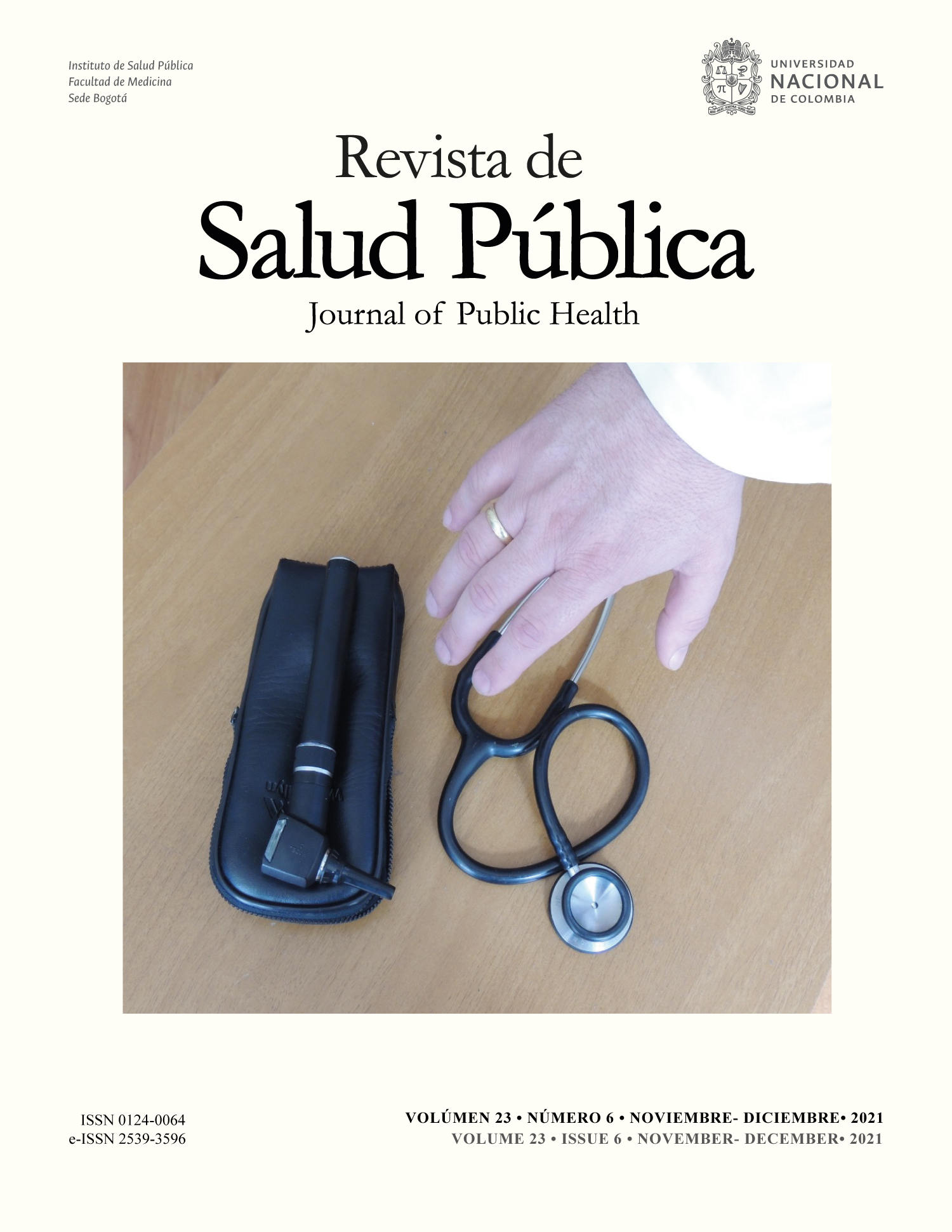Estudios ecológicos: herramienta clave para la salud pública
Ecological studies: a key tool for public health
DOI:
https://doi.org/10.15446/rsap.v23n6.94546Palabras clave:
Salud pública, epidemiología, estudios ecológicos, falacia ecológica (es)Public health, epidemiology, ecological studies, ecological fallacy (en)
Descargas
Los estudios ecológicos (EE) frecuentemente son analizados con actitud escéptica por investigadores, por considerar que las asociaciones obtenidas en estudios de tipo indi vidual presentan mayor nivel de evidencia científica que las referidas en los estudios poblacionales. Además, se argumenta que solo son utilizados para generar o probar hipótesis etiológicas. Sin embargo, los EE constituyen una alternativa útil para el abordaje de determinantes contextuales, ya que las variables agrupadas proporcionan información sobre atributos no captados por las variables individuales. Esta particularidad facilita la incorporación de los EE en estudios multinivel o contextuales de gran utilidad en la salud pública. Sobre estos fundamentos, se sustenta el propósito del presente ensayo en el cual se señalan los desafíos y las oportunidades presentes y futuras de los EE como herramienta clave para el cumplimiento de las funciones de la salud pública.
Ecological studies (ES) are frequently analyzed with a skeptical attitude by researchers, who consider that the associations obtained in individual-level studies present a higher grade of scientific evidence than those referred to in population studies. Furthermore, it is argued that ES are only used to generate or test etiological hypotheses. However, ES are a useful alternative for addressing contextual determinants since grouped variables provide information on attributes that are not captured by individual variables. This particularity facilitates the incorporation of ES in multilevel or contextual studies of great utility in public health. The purpose of this paper is based on these foundations, in which the present and future challenges and opportunities of ES as a key tool for the fulfillment of public health functions are pointed out.
Referencias
Detels R, Chuan Tan C. The scope and concerns of public health. In: Detels R, Gulliford M, Abdool Karim Q, Chuan Tan C, eds. Oxford Textbook of Global Public Health. 6th ed. Oxford: Oxford University press; 2015. p.3-17. DOI: https://doi.org/10.1093/med/9780199661756.003.0001
Rothman KJ, Greeland S, Lash TL. Modern Epidemiology. 3rd ed. Philadelphia: Lippincott Williams & Wilkins; 2008.
Brownson RC, Fielding JE, Green LW. Building Capacity for Evidence-Based Public Health: Reconciling the Pulls of Practice and the Push of Research. Annu Rev Public Health. 2018; 39(1):27-53. https://doi.org/10.1146/annurev-publhealth-040617-014746.
Diez-Roux AV. La necesidad de un enfoque multinivel en epidemiología. Región y Soc [Internet]. 2008 [cited 2021 Mar 2]; 20(2):77-91. https://bit.ly/3vxVwWY. DOI: https://doi.org/10.22198/rys.2008.2.a528
Loney T, Nagelkerke NJ. The individualistic fallacy, ecological studies and instrumental variables: a causal interpretation. Emerg Themes Epidemiol. 2014; 11(18):1-6. https://doi.org/10.1186/1742-7622-11-18.
Richard L, Gauvin L, Raine K. Ecological Models Revisited: Their Uses and Evolution in Health Promotion Over Two Decades. Annu Rev Public Heal. 2011; 32:307-26. https://doi.org/10.1146/annurev-publhealth-031210-101141.
Tu Y-K, Greenwood DC, eds. Modern Methods for Epidemiology. Dordrecht: Springer Netherlands; 2012. DOI: https://doi.org/10.1007/978-94-007-3024-3
Diez-Roux AV. Ecological variables, ecological studies, and multilevel studies in public health research. In: Detels R, Gulliford M, Abdool Ka- rim Q, Chuan Tan C, eds. Oxford Textbook of Global Public Health. 6th ed. Oxford: Oxford University Press; 2015. p.411-29. DOI: https://doi.org/10.1093/med/9780199661756.003.0104
Morgenstern H. Ecologic Studies. In: Rothman KJ, Greeland S, eds. Modern Epidemiology. 3rd ed. Philadelphia: Lippincott Williams & Wil- kins; 2008. p.511-31.
Wakefield J. Ecologic Studies Revisited. Annu Rev Public Health. 2008; 29(1):75-90. https://doi.org/10.1146/annurev.publhealth.29.020907.090821.
Blanco-Becerra LC, Pinzón-Flórez CE, Idrovo ÁJ. Estudios ecológicos en salud ambiental: más allá de la epidemiología. Biomédica. 2015; 35(0):191. https://doi.org/10.7705/biomedica.v35i0.2819.
Morgenstern H. Ecologic Studies in Epidemiology: Concepts, Principles, and Methods. Annu Rev Public Health. 1995; 16(1):61-81. https://doi.org/10.1146/annurev.pu.16.050195.000425.
Kirch W, ed. Population Attributable Risk (PAR). In: Encyclopedia of Public Health [Internet]. Dordrecht: Springer Netherlands; 2008. p.1117-8. https://doi.org/10.1007/978-1-4020-5614-7_2685.
Neumark Y. What can ecological studies tell us about death? Isr J Health Policy Res. 2017; 6(1):1-5. https://doi.org/10.1186/s13584-017-0176-x.
Lokar K, Zagar T, Zadnik V. Estimation of the Ecological Fallacy in the Geographical Analysis of the Association of Socio-Economic Deprivation and Cancer Incidence. Int J Environ Res Public Health. 2019; 16(3):296. https://doi.org/10.3390/ijerph16030296.
Zeoli AM, Paruk JK, Pizarro JM, Goldstick J. Ecological Research for Studies of Violence: A Methodological Guide. J Interpers Violence. 2019; 34(23-24):4860-80. https://doi.org/10.1177%2F0886260519871528.
Tu JV, Ko DT. Ecological studies and cardiovascular outcomes research. Circulation. 2008; 118(24):2588-93. https://doi.org/10.1161/CIRCULATIONAHA.107.729806.
Crosby RA, Salazar LF, DiClemente R. Ecological approaches in the new public health. In: DiClemente R, Salazar LF, Crosby RA, eds. Health Behavior Theory for Public Health: Principles, Foundations, and Applications. Chicago: Jones & Bartlett Leaning; 2013. p.231-52.
Yang J, Li Y, Liu Q, Li L, Feng A, Wang T, et al. Brief introduction of medical database and data mining technology in big data era. J Evid Based Med. 2020; 13(1):57-69. https://doi.org/10.1111/jebm.12373.
Dufault B, Klar N. The quality of modern cross-sectional ecologic studies: A bibliometric review. Am J Epidemiol. 2011; 174(10):1101-7. https://doi.org/10.1093/aje/kwr241.
Betran AP, Torloni MR, Zhang J, Ye J, Mikolajczyk R, Deneux-Tharaux C, et al. What is the optimal rate of caesarean section at population level? A systematic review of ecologic studies. Reprod Health. 2015; 12(1):57. https://doi.org/10.1186/s12978-015-0043-6.
Bai X-H, Peng C, Jiang T, Hu Z-M, Huang D-S, Guan P. Distribution of geographical scale, data aggregation unit and period in the correlation analysis between temperature and incidence of HFRS in mainland China: A systematic review of 27 ecological studies. PLoS Negl Trop Dis. 2019; 13(8). https://doi.org/10.1371/journal.pntd.0007688.
Mokoena KK, Ethan CJ, Yu Y, Shale K, Liu F. Ambient air pollution and respiratory mortality in Xi’an, China: a time-series analysis. Respir Res. 2019; 20(1):139. https://doi.org/10.1186/s12931-019-1117-8.
Rodríguez-Villamizar LA, Rojas-Roa NY, Blanco-Becerra LC, Herrera-Galindo VM, Fernández-Niño JA. Short-Term Effects of Air Pollution on Respiratory and Circulatory Morbidity in Colombia 2011-2014: A Multi-City, Time-Series Analysis. Int J Environ Res Public Health. 2018; 15(8):1610. https://doi.org/10.3390/ijerph15081610.
Susser M. The logic in ecological: II. The logic of design. Am J Public Health. 1994; 84(5):830-5. https://doi.org/10.2105%2Fajph.84.5.830.
Freedman DA. Ecological Inference [Internet]. Vol. 6, International Encyclopedia of the Social & Behavioral Sciences: Second Edition. Elsevier; 2001. p.868-870. http://dx.doi.org/10.1016/B978-0-08-097086-8.42117-3.
Ananth CV., Schisterman EF. Confounding, causality, and confusion: the role of intermediate variables in interpreting observational studies in obstetrics. Am J Obstet Gynecol. 2017; 217(2):167-75. https://doi.org/10.1016/j.ajog.2017.04.016.
Blakely TA, Woodward AJ. Ecological effects in multi-level studies. Epidemiol Community Health. 2000; 54(5):367-74. http://dx.doi.org/10.1136/jech.54.5.367.
Robinson WS. Ecological Correlations and the Behavior of Individuals. Am Sociol Rev. 1950; 15(3):351-7. https://doi.org/10.2307/2087176.
Idrovo AJ. Three Criteria for Ecological Fallacy. Environ Health Perspect. 2011; 119(8):900-7. https://doi.org/10.1289/ehp.1103768.
Cómo citar
APA
ACM
ACS
ABNT
Chicago
Harvard
IEEE
MLA
Turabian
Vancouver
Descargar cita
CrossRef Cited-by
1. Gimena Ramos, María Eugenia Elorza, Nebel Silvana Moscoso. (2024). Desigualdades sociales en la mortalidad por lesiones de tránsito: un estudio ecológico en las provincias de Argentina. Revista Facultad Nacional de Salud Pública, (42) https://doi.org/10.17533/udea.rfnsp.e354694.
2. Ángel Sebastián Rodríguez-Pazmiño, Darwin Paredes-Núñez, Daniel Ramos-Sarmiento, Karina Lalangui-Vivanco, Solon Alberto Orlando, Alexandra Narvaez, Greta Franco-Sotomayor, Miguel Angel Garcia-Bereguiain. (2025). An intersectionality perspective on tuberculosis: social determinants affecting tuberculosis mortality rate in Ecuador. Frontiers in Public Health, 13 https://doi.org/10.3389/fpubh.2025.1659887.
Dimensions
PlumX
Visitas a la página del resumen del artículo
Descargas
Licencia

Esta obra está bajo una licencia internacional Creative Commons Atribución 4.0.
Esta revista provee acceso libre inmediato a su contenido bajo el principio de que hacer disponible gratuitamente investigación al publico apoya a un mayor intercambio de conocimiento global.
Todos los contenidos de esta revista, excepto dónde está identificado, están publicados bajo una Licencia Creative Commons Atribución 4.0.





















